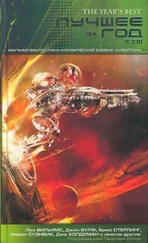“Soul? I see you are a dualist,” says Victor, with a little laugh, so as to move the subject onto less personal ground.
Gruber frowns. “Dualist? My dear fellow, I study the philosophy of the Cassiopeians. I am a trialist. I am a trialist through and through!”
Victor smiles politely, looks at his watch and opens his laptop so as to discourage Gruber from carrying on the conversation. Conversation is such hard work. It involves having to be someone.
“Your wife?” asks Gruber, nodding at the picture of a rather tense-looking young woman on Victor’s desktop.
“My girlfriend,” says Victor, for some reason blushing. “She’s a computer scientist too, back in Cambridge.”
Gruber smiles his amiable, knowing smile. He takes out a battered paperback, folds it brutally back on itself and reads, glancing across from time to time at the young Englishman whose hands dart so quickly and neatly over the keyboard.
Darkness starts to fall outside. Stars appear: Orion, Taurus. An evening meal is served by the pretty robots.
“They make their flesh from genetically modified shellfish tissue, I believe,” says Gruber loudly, swivelling stiffly round in his seat to look at the hostess. “ Patella Aspera , the common limpet. It’s good at clinging onto things!”
Victor smiles politely, cutting into his pork chop. Synthetiks first emerged from the laboratory a couple of years previously, and they are still banned in the UK, though the ban is currently being challenged in the European Court. As a computer scientist he rather scorns the publicity given to the semi-human, semi-molluscan flesh. Simulated human tissue is yesterday’s technology. The real technical achievement about synthetics, the true master-stroke, is the brilliant programming which allow them to faithfully mimic the movements of the human body and face.
But perhaps you have to be a computer man to understand just how very clever that is.
“You English are wise to ban them of course,” mutters the German philosopher, turning back to attend to his food. “What I said earlier was true but completely beside the point. The attraction between real human beings may well often begin as a physical matter, but that is the mere starting point, the foundation on which the whole magnificent edifice of sexual love is built. But a synthetik is a starting point for nothing, the foundation of nothing.”
Victor doesn’t enjoy conversation with strangers. But, seeing that conversation of some sort seems inevitable, he changes the subject.
“You were saying you have made a study of the Cassiopeians,” he says. “I must admit I don’t know much about them. I rather lost track after the news first broke, and those pictures came out. Tell me about trialism .”
“You don’t know much about them?! How can any educated…” Gruber makes a gesture of exasperation. “Well, I suppose I can’t accuse you of being unusual in that respect! But it never ceases to amaze me that five years after the most astounding event in human history, hardly anyone seems to give it a moment’s thought. Would you believe, the research money for textual analysis is actually drying up now, though the message is still coming through as clear as ever from the sky!”
Victor feels a little ashamed. “Well, I suppose it is rather appalling when you put it like that! I guess it was when we all realised that the source was 200 light-years away and there was no possibility at all of a dialogue or physical contact. And then it came out that it was all rather obscure philosophical ramblings and nothing that we could really use …I suppose it just became another one of those amazing things that we get used to: like cities on the moon or… or robot air hostesses with human flesh!”
The German snorts. “No doubt. But really is there any comparison between these little technological tricks that you mention and the discovery of other thinking minds among the stars?”
He rolls his eyes upward. “But then, no one is interested in thinking any more. You are quite right: when governments and corporations discovered that it was philosophy the Cassiopeians were sending out, that really was the last straw. They’d hoped for new technologies, new sciences, new powers over the physical world… But philosophy !”
He sighs extravagantly. “In answer to your question about trialism. The Cassiopeians organize the world in threes. They have three sexes, three states of matter, three dimensions of space, three modes of being… and above all, three great forces, struggling for dominance in the world: Valour, Gentleness and Evil.”
“Not Good and Evil?”
“No, no, no. They have no concept of ‘Good.’ It would seem quite incomprehensible to them that we could compound two such obviously unmixable essences as Valour and Gentleness into a single word. To the Cassiopeians, all three forces are equally incompatible. Gentleness tells us to do one thing, Evil tells us to do another, and Valour – it tells us to do another thing again.”
Victor smiles, with dry, polite scepticism. “I hadn’t realised that the translation had got to this stage. I thought I read somewhere there was still a lot of controversy about the text.”
The German growls darkly: “ Ja, ja, ja , a lot of controversy…”
* * *
As they separate in the airport, Gruber presses a card into Victor’s hand. “Come and see me if you have the time. It is not every day after all that you will meet a naturalised Cassiopeian!”
His eyebrows bristle as he glares around at silvery robot security guards, robot porters, male and female synthetiks with bright smiles manning the airline check-in desks. “In fact, even a genuine human being is becoming something of a rarity!”
Victor says something insincere, but he is no longer paying attention to the peculiar old man. He has spotted his German friends, Franz and Renate.
“Victor, how nice to see you! How are you? How is Lizzie? How is Cambridge?”
They are bright, polite, smartly dressed young people, who Victor and Lizzie met when they spent a year in Cambridge. After the eccentric Gruber, who might at any time say something embarrassing, they seem very normal and unthreatening and easy to get along with. Victor shakes their hands and exchanges minor news. They take him out to their little electric car (fossil fuels are verboten in the new Green Berlin) and head off in the direction of their Schoneberg apartment where he is to stay till he has found accommodation of his own.
“But I’ve forgotten if you’ve ever been here before?” says Franz.
“Strangely enough no. Very provincial of me, I know, not to have visited the capital of Europa!”
The two Germans laugh, pleased.
“Come now Victor,” says Renate, “surely even an Englishman knows that the capital of Europa is Brussels!”
“Well you know what they say: the President of the Commission sits in Brussels but when he puts in a claim for expenses it’s Chancellor Kommler who signs the form.”
The Germans smile. These bantering exchanges, with their little hidden barbs of jealousy, are the bread-and-butter of contacts between young Euro-professionals all over the continent, as they shake down into a single, transnational class.
“Well,” says Franz, “how about a little tour of this city of ours before we head for home?”
They drive through bright modern streets: tidy parks, tastefully restored old buildings. They drive past the Brandenburg Gate and the Reichstag. They go down the Kurfurstendamm. Franz points out the Volkskammer and the TV Tower from the gloomy days of the DDR. They drive along the boundary fence of Lichtenberg II, reputedly the largest Underclass estate in Europa, looking across with a small frisson (rather as an earlier generation might have looked across the famous Wall) at the monolithic apartment blocks within, where live the gastarbeiters , the unemployed, the outcasts of Europa’s prosperous new order.
Читать дальше











